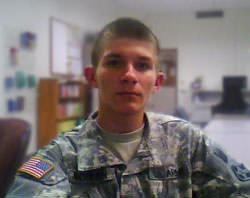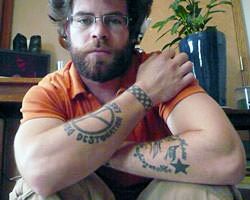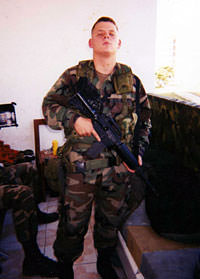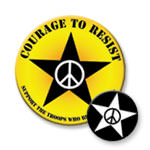
Tony Anderson court martial Tuesday Five simple things you can
do Sign the
petition to support the Hempstead 15 (link
only)
Veterans Day call by IRR resisters to 'Stop the War'
On this day, Veteran's Day, we would like to express to the American public why we, veterans of the Global War on Terror, have chosen to refuse orders to reactivate into military service. We are direct witnesses to the horrors of this war, having experienced its atrocities at their source, and we have decided that we can no longer carry out these illegal and immoral policies. We believe that veterans and active-duty GIs are in a key position to stop illegal and unjust war, and we are inspired by the resistance of troops who stood against the war in Vietnam. One of the preeminent reasons for the U.S. withdrawal from Vietnam was increasing dissent among the active-duty troops stationed abroad and at home. By the end of the war, there were entire units refusing to participate in combat, many going as far as outright mutiny.
To compensate for huge pitfalls in recruitment since the invasion of Iraq, the military has resorted to recalling former service members. This policy is known as "involuntary activation" and utilizes deactivated service members who still have time on their contracts in the Individual Ready Reserves (IRR) to fill shortcomings in specific job specialties. The abuse and misuse of this policy has escalated under the current administration to such a degree that it can now only be viewed as a "backdoor draft" that targets the same disadvantaged individuals the military sought out for enlistment, namely because they are better at not questioning orders. However, we have now begun to question these orders. We are veterans of the wars in Iraq and Afghanistan and members of the IRR who have refused or will refuse any activation orders that would lead to us serving an unjust and imperial U.S. foreign policy. It is a prevailing notion that this refusal is unpatriotic, but we consider our actions the only choice. Not only did the U.S. invasions of Iraq and Afghanistan do great harm to the people of those countries, but it undermined the ostensible goal with which the wars were begun: Instead of stopping terrorism, it has proliferated terrorism, an expectation that was predicted well before the war started. By refusing activation, we are refusing to participate in wars that serve the purposes of furthering the careers of politicians and high-ranking officers. We openly support other IRR members who follow in these footsteps. The military is a force that rules through fear of retribution for disobeying its will. In reality, more than a third of IRRs simply refuse to report to duty. Most of the rest report out of fear that the military will change their discharge status or prosecute them for desertion, but up to this point, prosecution has been rare. Members of the IRR are not under the Uniform Code of Military Justice (UCMJ), and thus far, the military has had a practice of not prosecuting them with criminal charges unless they report in some form or function to activate. Very few willingly volunteer for activation. There can be no promise that President-Elect Barack Obama will stop the stressful and unfair techniques of back-to-back deployments, "stop-loss" or the "backdoor draft" that are damaging the psychology of veterans in irreparable ways. Nor that he will stop encouraging global violence by unlawful uses of force. It is in this vein that we turn to organizations like Courage to Resist, Iraq Veterans Against the War and many other large-scale and grassroots organizations to solicit change in a largely unrepresentative democracy, and to allow the voices of the people to ring through the halls of the Capital. Benjamin Lewis, former Marine Corps mortarman, Iraq veteran, IRR recall resister Brandon Neely, former U.S. Army Military Police, Iraq veteran, IRR recall resister
Iraq War resister Tony Anderson trial Tuesday 
By Courage to Resist The U.S. Army plans to court martial Pvt Tony Anderson next Tuesday, November 17 for his refusal to deploy to Iraq in July. He faces two years in an Army stockade and a dishonorable discharge. "I don't feel that it's right to take someone else's life," said 19 year-old Private Tony Anderson to Courage to Resist's Sarah Lazare. "I felt that if it came down to it, I couldn't kill someone, in Iraq or anywhere." Anderson was speaking on phone while being watched by his commanding officer at Ft. Carson, Colorado where he is stationed. Tony refused to deploy to Iraq in July of this year. Tony thought about filing for a conscientious objector discharge but was discouraged from doing so by his commanding officers. They told him that it would not be possible for him to obtain a discharge, and even flat-out lied saying that he was "not the right religion." Anderson was led to believe that filing a C.O. application would be futile. When he was ordered to deploy to Iraq on July 1st, Tony decided he could not go. Just hours before boarding his flight, he went AWOL, eventually turning himself in after 22 days in hopes of diminishing the severity of his punishment. On his return, Tony was again ordered to deploy to Iraq immediately. This time, he simply refused, and he says, "they haven't tried to deploy me since then because they realize I'm not going to go." Courage to Resist has pledged $1,500 to cover Tony's civilian legal defense, but we need your help to do so. Donate to Tony's defense at
...to organize war resister support in your community
Support networks are a vital part of the war resistance movement: providing political, emotional, and material support to military objectors and helping amplify their stories of resistance lays the foundation for a strong movement and ensures that resisters do not have to go it alone. Through collective aid and alliance, we can act directly to stop unjust war and occupation. This document contains suggestions about how your local community can get involved in these efforts. Please keep in mind that this is not meant to be a blueprint for what your organizing must look like, but rather, a collection of ideas and possibilities, to provide a starting point for those who are not sure how to begin. Courage to Resist would love to work with you in the future to figure out how these ideas best fit in with your community. |

 IRR resisters on Vets Day: 'Stop the War'
IRR resisters on Vets Day: 'Stop the War'  By Benjamin Lewis (photo right) and Brandon Neely (photo
below),
By Benjamin Lewis (photo right) and Brandon Neely (photo
below),  The United States learned a lesson from the Vietnam War: that it is
unlikely, except in the event of self-defense, that regular civilians
will execute the life-threatening orders that are given to them by
military authority. The solution of policy makers was to create an
all-volunteer force that negated the need for a draft. This translates
into a mercenary force composed of America's disadvantaged: a sector of
the U.S. demographic that is particularly susceptible to military
recruitment for lack of other options and finding themselves with
deployment orders again and again.
The United States learned a lesson from the Vietnam War: that it is
unlikely, except in the event of self-defense, that regular civilians
will execute the life-threatening orders that are given to them by
military authority. The solution of policy makers was to create an
all-volunteer force that negated the need for a draft. This translates
into a mercenary force composed of America's disadvantaged: a sector of
the U.S. demographic that is particularly susceptible to military
recruitment for lack of other options and finding themselves with
deployment orders again and again. By Courage to
Resist. November 7, 2008
By Courage to
Resist. November 7, 2008